Dharma Begins Where Religion Ends
Ankit Gupta | Apr 10, 2025, 11:23 IST
At first glance, the statement seems rebellious — almost sacrilegious. How can Dharma, the sacred essence of righteousness, truth, and cosmic order, emerge from the absence of religion, which claims to be its custodian? But this is precisely the paradox that must be embraced, especially in an age where religion has often lost its soul and Dharma waits silently to return.
धर्म एव हतो हन्ति धर्मो रक्षति रक्षितः।
तस्माद्धर्मो न हन्तव्यो मा नो धर्मो हतोऽवधीत्॥
(“Dharma, when destroyed, destroys; Dharma, when protected, protects.
Therefore, Dharma should never be destroyed, lest it destroy us in return.”)
— Manusmriti 8.15
The Confusion Between
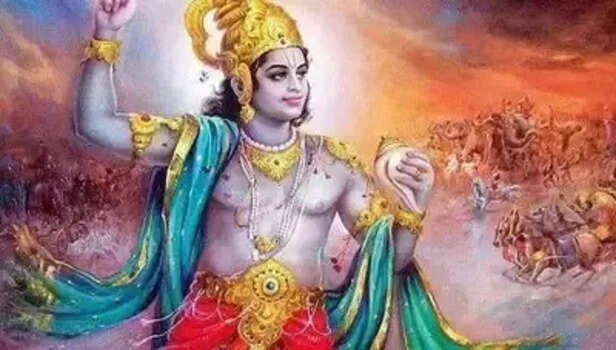
The confusion stems from translation. Dharma is not "religion." The English word “religion” is derived from religare — to bind, to tie. It’s about structure, belief, conformity. Dharma, however, is fluid, evolving, living. It is not something that you believe in; it is something you live.
Religion tells you what to worship; Dharma tells you how to be — with yourself, with others, with the cosmos.
Shri Krishna did not say to Arjuna, "Follow this religion." He said, “स्वधर्मे निधनं श्रेयः” — “Better to die in your own dharma.” The message was existential, not sectarian.
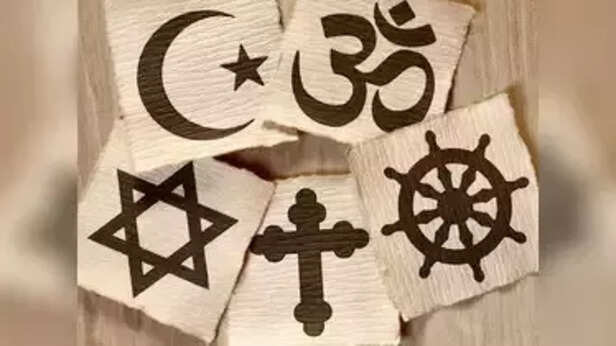
When the infinite truth of Dharma was institutionalized into organized religion, it began to decay. What was once open to all seekers became the property of a few priests. What was once a path of inner awakening became a battlefield of outer dominance. Flags replaced flames, and temples became tools of power rather than places of inner silence.
This is true across the world. Be it the wars of the Church, the caste rigidity within Hindu sects, or the violent fanaticism of exclusivist ideologies — religion, when cut off from Dharma, becomes a force of control rather than liberation.
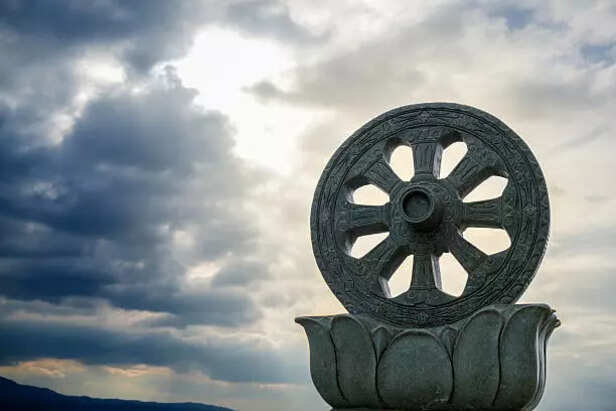
Dharma is not historical — it is Sanatan (eternal). It does not begin with the birth of a prophet or the writing of a scripture. It is woven into the structure of reality. It is the rhythm of the sun and moon, the humility of the tree, the sacrifice of the mother, the honesty of a moment.
To live in Dharma is to align oneself with the deeper truth that governs all things. It is not obedience to an external code, but devotion to an inner clarity.
When Shri Rama walked into the forest, it was not religion — it was Dharma. When Mahavira renounced the world, when Buddha sat beneath the Bodhi tree, when Kabir sang his fearless couplets — they were not preaching religion; they were dissolving it.
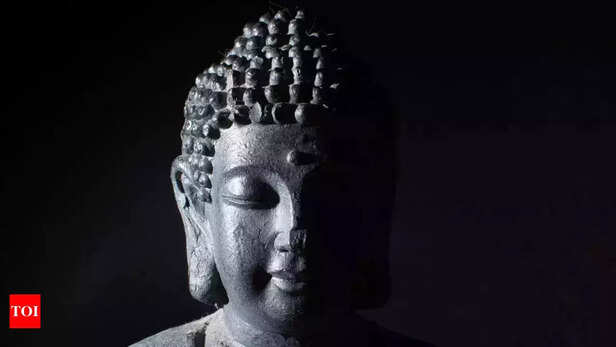
Religions, by their nature, create boundaries. “We are saved; you are not.” “This is the only truth; all others are false.” Dharma does not do this. It allows the existence of many truths — Ekam sat, vipra bahudha vadanti — “Truth is one; sages call it by many names.”
Dharma has no quarrel with another’s path. It only asks: Is your path making you more honest, more compassionate, more aware?
Religion says: Convert.
Dharma says: Transform.
What happens when religion dissolves? We lose our identities — but we find our essence. We are no longer Hindus, Muslims, Christians, Buddhists. We are just humans in search of truth, peace, and liberation.
The Upanishads never said, “You are a Brahmin” or “You are a devotee.” They said, Tat Tvam Asi — “You are That.” Not a follower of God. You are That — Consciousness itself.
This is the radical freedom Dharma offers — the realization that divinity is not separate from you, not hidden in a temple or book, but pulsing through your very breath.
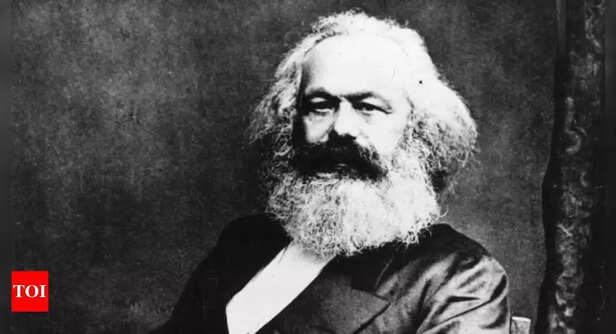
Karl Marx famously described religion as “the opium of the people,” but this phrase is often misunderstood when taken out of context. Marx did not simply dismiss religion as evil; rather, he saw it as a reflection of deep social and economic suffering. In his view, religion was both an expression of pain and a protest against it — a way for oppressed people to find comfort in a harsh, unjust world. Like opium, religion dulled the agony of existence but did not cure the underlying illness. Marx believed that religion provided emotional relief and meaning, but it also served as a tool of control, encouraging people to accept inequalities and oppression by promising rewards in the afterlife. It made people passive in the face of injustice, reinforcing existing power structures and preventing revolutionary change. For Marx, the real issue was not religion itself, but the conditions that made people need religion — poverty, exploitation, alienation. In a truly free and equal society, Marx argued, religion would naturally wither away, as people would no longer need illusions to cope with suffering. Thus, Marx’s critique of religion was not just theological, but fundamentally political and economic, rooted in his vision of human liberation.
This is not a call for atheism or iconoclasm. It is a call for purity. Let religion dissolve into its original purpose: to connect us to the highest. Let temples become spaces of silence, not commerce. Let rituals become sacred acts of awareness, not blind repetitions.
Only then will Dharma return — not as a set of rules, but as a way of being. As the Buddha said, Appo deepo bhava — “Be a light unto yourself.”
The Prophet becomes unnecessary when the lamp within is lit.
The world does not need another religion. It needs awakened individuals — rooted in Dharma. It needs more kindness, more courage, more authenticity. It needs men and women who can say no to blind conformity and yes to conscious living.
When that happens, Dharma will rise again — not as a doctrine, but as the fragrance of a society where truth is more important than dogma, and love is more sacred than labels.
So yes — Dharma will come when religion will go away. Not because religion is evil, but because it has fulfilled its function. Like a boat that must be left behind once the shore is reached.
And on that far shore, what will greet us will not be a new ism — but an ancient silence, a quiet truth, and the steady rhythm of the eternal Dharma.
तस्माद्धर्मो न हन्तव्यो मा नो धर्मो हतोऽवधीत्॥
(“Dharma, when destroyed, destroys; Dharma, when protected, protects.
Therefore, Dharma should never be destroyed, lest it destroy us in return.”)
— Manusmriti 8.15
The Confusion Between Dharma and Religion

Shri Krishna
The confusion stems from translation. Dharma is not "religion." The English word “religion” is derived from religare — to bind, to tie. It’s about structure, belief, conformity. Dharma, however, is fluid, evolving, living. It is not something that you believe in; it is something you live.
Religion tells you what to worship; Dharma tells you how to be — with yourself, with others, with the cosmos.
Shri Krishna did not say to Arjuna, "Follow this religion." He said, “स्वधर्मे निधनं श्रेयः” — “Better to die in your own dharma.” The message was existential, not sectarian.
The Institutionalization of the Infinite

Religious Institutions
When the infinite truth of Dharma was institutionalized into organized religion, it began to decay. What was once open to all seekers became the property of a few priests. What was once a path of inner awakening became a battlefield of outer dominance. Flags replaced flames, and temples became tools of power rather than places of inner silence.
This is true across the world. Be it the wars of the Church, the caste rigidity within Hindu sects, or the violent fanaticism of exclusivist ideologies — religion, when cut off from Dharma, becomes a force of control rather than liberation.
Dharma—The Eternal, Not the Historical

Wheel of Dharma
Dharma is not historical — it is Sanatan (eternal). It does not begin with the birth of a prophet or the writing of a scripture. It is woven into the structure of reality. It is the rhythm of the sun and moon, the humility of the tree, the sacrifice of the mother, the honesty of a moment.
To live in Dharma is to align oneself with the deeper truth that governs all things. It is not obedience to an external code, but devotion to an inner clarity.
When Shri Rama walked into the forest, it was not religion — it was Dharma. When Mahavira renounced the world, when Buddha sat beneath the Bodhi tree, when Kabir sang his fearless couplets — they were not preaching religion; they were dissolving it.
Religion Divides, Dharma Unites

"Be your own Light" - Buddha
Religions, by their nature, create boundaries. “We are saved; you are not.” “This is the only truth; all others are false.” Dharma does not do this. It allows the existence of many truths — Ekam sat, vipra bahudha vadanti — “Truth is one; sages call it by many names.”
Dharma has no quarrel with another’s path. It only asks: Is your path making you more honest, more compassionate, more aware?
Religion says: Convert.
Dharma says: Transform.
The Inner Shift: From Identity to Essence
The Upanishads never said, “You are a Brahmin” or “You are a devotee.” They said, Tat Tvam Asi — “You are That.” Not a follower of God. You are That — Consciousness itself.
This is the radical freedom Dharma offers — the realization that divinity is not separate from you, not hidden in a temple or book, but pulsing through your very breath.
Religion is the Opium of the Masses

Karl Marx
Karl Marx famously described religion as “the opium of the people,” but this phrase is often misunderstood when taken out of context. Marx did not simply dismiss religion as evil; rather, he saw it as a reflection of deep social and economic suffering. In his view, religion was both an expression of pain and a protest against it — a way for oppressed people to find comfort in a harsh, unjust world. Like opium, religion dulled the agony of existence but did not cure the underlying illness. Marx believed that religion provided emotional relief and meaning, but it also served as a tool of control, encouraging people to accept inequalities and oppression by promising rewards in the afterlife. It made people passive in the face of injustice, reinforcing existing power structures and preventing revolutionary change. For Marx, the real issue was not religion itself, but the conditions that made people need religion — poverty, exploitation, alienation. In a truly free and equal society, Marx argued, religion would naturally wither away, as people would no longer need illusions to cope with suffering. Thus, Marx’s critique of religion was not just theological, but fundamentally political and economic, rooted in his vision of human liberation.
When Religion Ends, Dharma Begins
Only then will Dharma return — not as a set of rules, but as a way of being. As the Buddha said, Appo deepo bhava — “Be a light unto yourself.”
The Prophet becomes unnecessary when the lamp within is lit.
A Future Beyond Religion
When that happens, Dharma will rise again — not as a doctrine, but as the fragrance of a society where truth is more important than dogma, and love is more sacred than labels.
So yes — Dharma will come when religion will go away. Not because religion is evil, but because it has fulfilled its function. Like a boat that must be left behind once the shore is reached.
And on that far shore, what will greet us will not be a new ism — but an ancient silence, a quiet truth, and the steady rhythm of the eternal Dharma.
